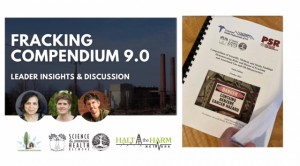We invite you to an engaging panel discussion revolving around the newly unveiled Fracking Science Compendium 9.0 on November 1st, 2023, at 2pm.
>>> More details and registration
Learn about this new release, current science, and gain a deeper understanding of how grassroots leaders can utilize this compendium to its fullest potential in our advocacy efforts.
The Fracking Science Compendium, now in its ninth edition continues to be a robust, fully referenced compilation of scientific, medical, and media findings demonstrating the risks and harms associated with fracking and the broader oil and gas infrastructure.
This edition notably broadens the scope by connecting the health risks of gas appliances to the fracking industry as a whole. The ongoing research underscores the dire implications on public health, climate, and environmental justice, affirming many early warnings noted in the previous editions.
The panel will include speakers:
1. Ranjana Bhandari, founder and executive director of the frontline organization Liveable Arlington
2. Sandra Steingraber, Concerned Health Professionals of New York, a program of the Science and Environmental Health Network, where she also serves as Senior Scientist.
>>> RSVP for the Fracking Science Compendium 9.0 Panel Discussion
If you have any questions for our panelists or topics you’d like to raise, please reply to this email and RSVP if you want access to our recorded discussion as well.
We look forward to seeing you there!
Best, Ryan Clover, Halt the Harm Network
#######+++++++#######+++++++########
See Also: Research by public health experts shows ‘damning’ evidence on the harms of fracking; Jon Hurdle | Inside Climate News, October 28, 2023
Research by public health experts shows ‘damning’ evidence on the harms of hydraulic fracturing for oil and gas is linked to an array of health harms, including cancer, cardiovascular disease, asthma and birth defects, according to the latest compilation of studies on the impact of fracking on human health.
The ninth edition of a “compendium” of scientific, medical, government and media reports on the industry’s health effects, released Oct. 19, contains references to almost 2,500 papers that add to evidence that fracking has an array of negative impacts on human health, the authors say.
The number of studies collected is now more than six times what it was when the first compendium was published in 2014, but the conclusions are the same, said Dr. Sandra Steingraber, the lead author, and a member of Physicians for Social Responsibility and Concerned Health Professionals of New York, which jointly published the 637-page document.
Many of the studies were based in Pennsylvania, which produces more natural gas from fracking than any other U.S. state except Texas, and has a relatively high population of about 12 million people, giving researchers more opportunity to determine the effects of fracking on public health than in more sparsely populated fracking states such as Wyoming.
“The new studies corroborate and support the older studies and we can see the same patterns in state after state where fracking is practiced,” Steingraber said. “The fact that there is lots of new data that support the older data means that the case against fracking is ever more damning.”

